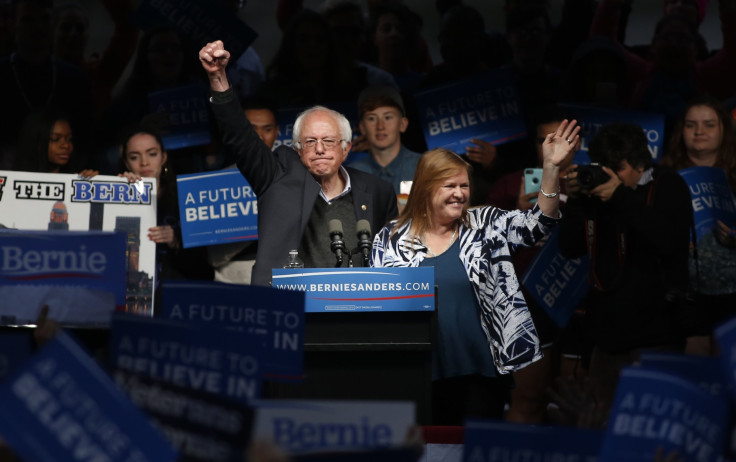Can Bernie Sanders Still Win? 2016 Delegate Count Does Not Look Good For Vermont Senator

Bernie Sanders may have won the Indiana primary Tuesday night, but his victory is unlikely to save his proclaimed political revolution. After this week, it is mathematically impossible for Sanders to reach the number of delegates necessary to win the Democratic nomination using pledged delegates alone.
This means the Vermont senator will have to rely on his strategy of winning over superdelegates — party leaders and elites who can back the candidate of their choice — who have already decided to back his rival Hillary Clinton. But Clinton has so far won 520 superdelegates to his 39, making it unlikely that he can move forward down this path.
Sanders' campaign has said he will stay in the race until the Democratic National Convention in July, and has argued that his supporters’ enthusiasm and his electability could be enough to win party leaders over to his side.
“It's virtually impossible for Secretary Clinton to reach the majority of convention delegates by June 14 with pledged delegates alone,” Sanders said Sunday, according to the Washington Post. “She will need superdelegates to take her over the top at the convention in Philadelphia. In other words, the convention will be a contested contest.”
It's true that the convention probably will be contested, but that is because Sanders will contest it. Fifteen percent of all Democratic delegates are superdelegates, so any candidate needs about an 18 percent lead in the elected delegate count by the end of the primary voting season to avoid relying on some superdelegates.
Right now, Clinton's lead over Sanders among elected delegates amounts to about 13 percent of the majority needed, which is more than Barack Obama's 4 percent lead by the end of the 2008 primaries, according to the Washington Post. That margin is likely to stay about the same until the end of the voting, but that's not the whole math picture.
After winning Indiana, Sanders has 1,361 pledged delegates, according to the Associated Press’ count, and Clinton has 1,682, giving her a 321-delegate lead. A candidate needs 2,383 delegates to win the nomination, so Sanders would need 1,022 more pledged delegates if he were to win with those alone, while Clinton would need just another 701.
The remaining primary contests — Guam, West Virginia, Kentucky, Oregon, Virgin Islands, Puerto Rico, California, Montana, New Jersey, New Mexico, North Dakota, South Dakota and the District of Columbia — have just 933 pledged delegates up for grabs.
If we're looking at overall delegates — pledged and super — Sanders stands at 1,400 and Clinton at 2,202. That means the Vermont senator needs 983 more delegates to reach the magic number and Clinton needs just 181.
Using a combination of delegates, because it's likely that both candidates will need to do so, Clinton must win about 19 percent of the remaining delegates and Sanders must win about 81 percent of them to reach 2,383, according to an analysis from NBC News.
But just because the math is not in his favor does not mean Sanders' revolution is over. He has said that, aside from winning, he hopes to influence the Democratic Party’s platform at the convention, and that may be a more attainable goal.
For now, though, Sanders is focused on competing as long as he can. In the past, he has criticized the superdelegate system as undemocratic and his supporters often say these free-floating delegates give Clinton, the establishment-backed candidate, an unfair advantage. But with Clinton's much higher total number of delegates, she is significantly closer to clinching the nomination and she has won more of the popular vote than Sanders has at this point. So if the Vermont senator is to win over superdelegates, he will need to take advantage of the system he has so often criticized and convince members of the establishment to support him over the will of many voters.
© Copyright IBTimes 2025. All rights reserved.






















